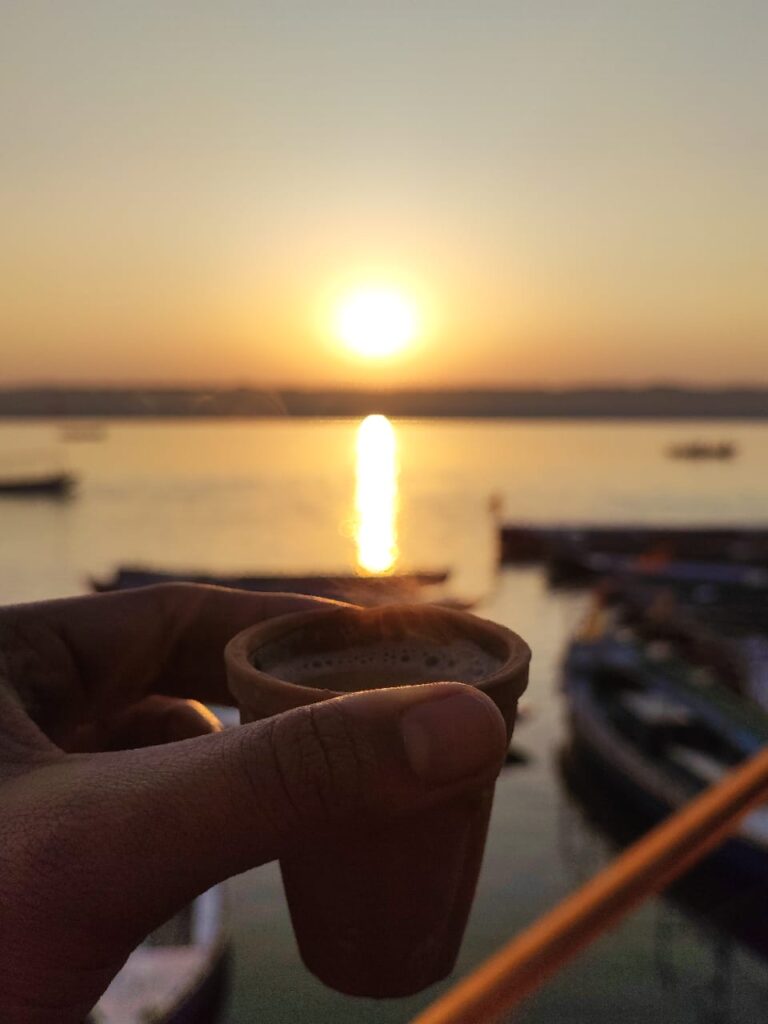Here is a quick guide for you!
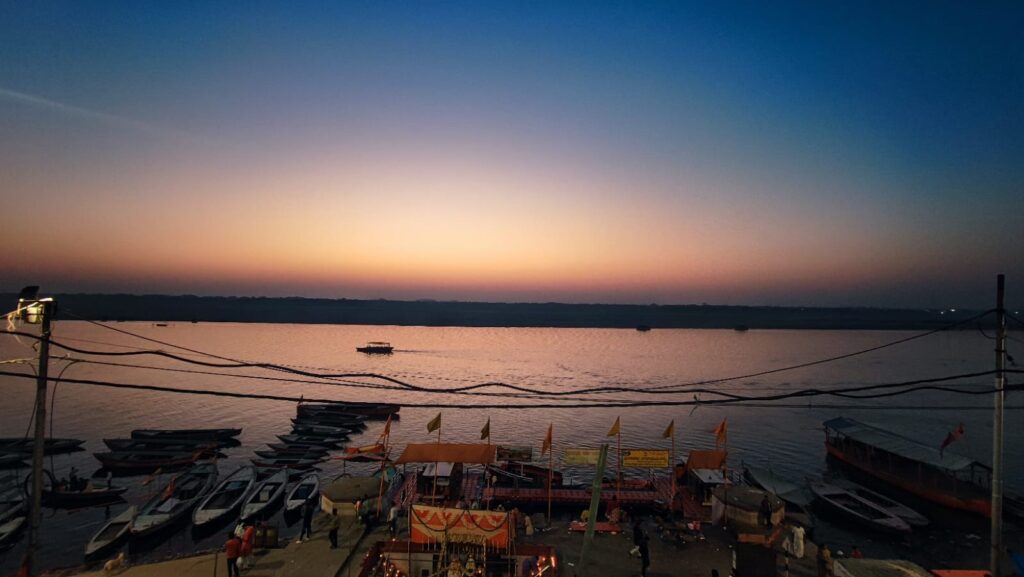
Best time to visit Varanasi
The best time to visit Varanasi is during the winter months, from October to March. During this time, the weather is pleasant and comfortable, with temperatures ranging from around 15°C to 25°C (59°F to 77°F).
This period offers clear skies and minimal rainfall, making it ideal for sightseeing, attending religious ceremonies, and exploring the city’s vibrant streets and ghats.
Additionally, several festivals and events take place during the winter season in Varanasi, including Diwali, Dev Deepawali, and Makar Sankranti, adding to the cultural richness and festive atmosphere of the city.
Exploring the Spiritual Soul of India
Varanasi, situated along the sacred Ganges River in India, is an ancient city steeped in spirituality and tradition. Let’s dive deep into this blog. If you want to visit Varanasi soon,.
Revered as the holiest of cities by Hindus, it’s renowned for its ghats, temples, and daily rituals, offering a captivating glimpse into India’s rich cultural heritage and spiritual essence.
Varanasi, also known as Kashi or Banaras, holds a special place in the hearts of millions of Hindus worldwide. It is believed to be one of the oldest continuously inhabited cities in the world, with a history that dates back thousands of years.
Situated on the banks of the Ganges River in the northern Indian state of Uttar Pradesh, Varanasi is considered one of the holiest cities in Hinduism.
Varanasi’s timeless charm lies in its ability to seamlessly blend ancient traditions with modern life. It’s a city where spirituality permeates every aspect of daily existence, from the ringing of temple bells to the chanting of mantras on the ghats.
Visiting Varanasi is not just a journey to a sacred destination; it’s an immersion into the soul of India, where the past and present converge in a timeless embrace.
Boat Ride on the Ganges
Embark on a captivating journey by taking a boat ride along the sacred Ganges River at sunrise or sunset. Witness the breathtaking beauty of Varanasi unfold as you glide past the majestic ghats (riverfront steps) lining the banks. These ghats, bathed in the golden hues of dawn or the fiery colors of dusk, are not just architectural marvels but also vibrant centers of spiritual life. Watch as devotees perform their morning or evening rituals, offering prayers and bathing in the holy waters. The experience is sure to leave you mesmerized by the unique blend of spirituality, history, and cultural richness that defines Varanasi.
Attend the Ganga Aarti
Experience the mesmerizing Ganga Aarti ceremony, held daily at Dashashwamedh Ghat. Attending the Ganga Aarti in Varanasi is a mesmerizing and deeply spiritual experience that shouldn’t be missed.
Priests perform elaborate rituals with fire, incense, and lamps, accompanied by chants and devotional music, creating a captivating atmosphere.
The Aarti ceremony embodies both reverence and gratitude towards the Ganges. This mighty river, believed to possess the power to purify sins and bestow blessings upon those who bathe in its waters, becomes the focus of this devotional ritual. Furthermore, the Aarti serves as a conduit for devotees to connect with the divine and seek spiritual upliftment.
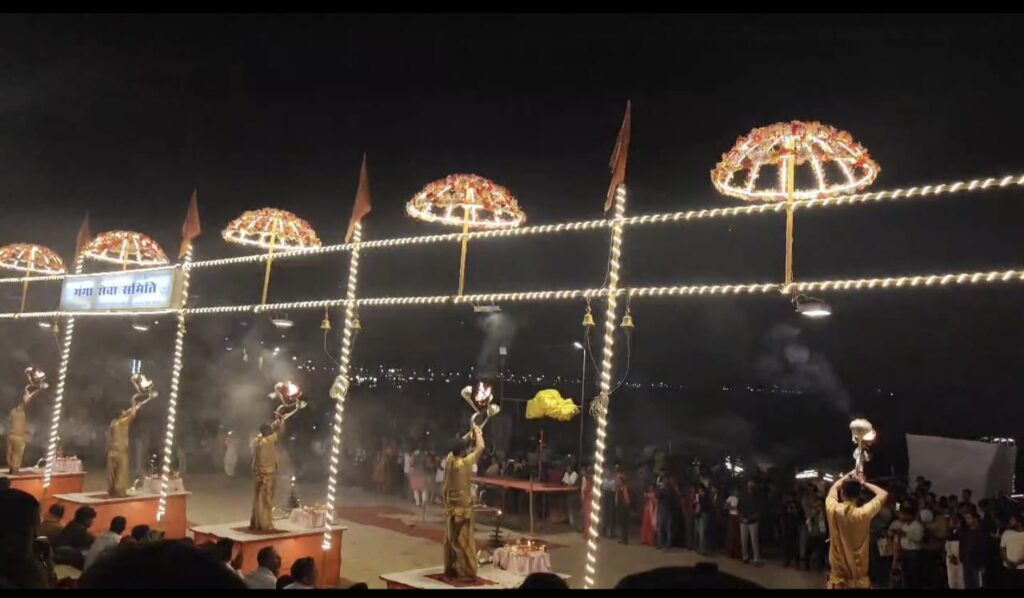
Explore the Ghats
Exploring the ghats in Varanasi is an immersive journey into the heart and soul of this ancient city. Varanasi’s ghats line the banks of the Ganges River, each with its own significance and atmosphere.
Devotees gather at dawn to bathe in the sacred waters, seeking purification and blessings.
The ghats host vibrant markets selling religious items, souvenirs, and street food, adding to the bustling atmosphere.
Boat rides along the river offer panoramic views of the ghats and the city’s skyline, providing a tranquil escape from the hustle and bustle.
Sunset is a magical time at the ghats, as the golden light bathes the ancient architecture and creates a serene ambiance.
Observing the continuous flow of life, from morning rituals to evening gatherings, offers a profound insight into the spiritual and cultural fabric of Varanasi.
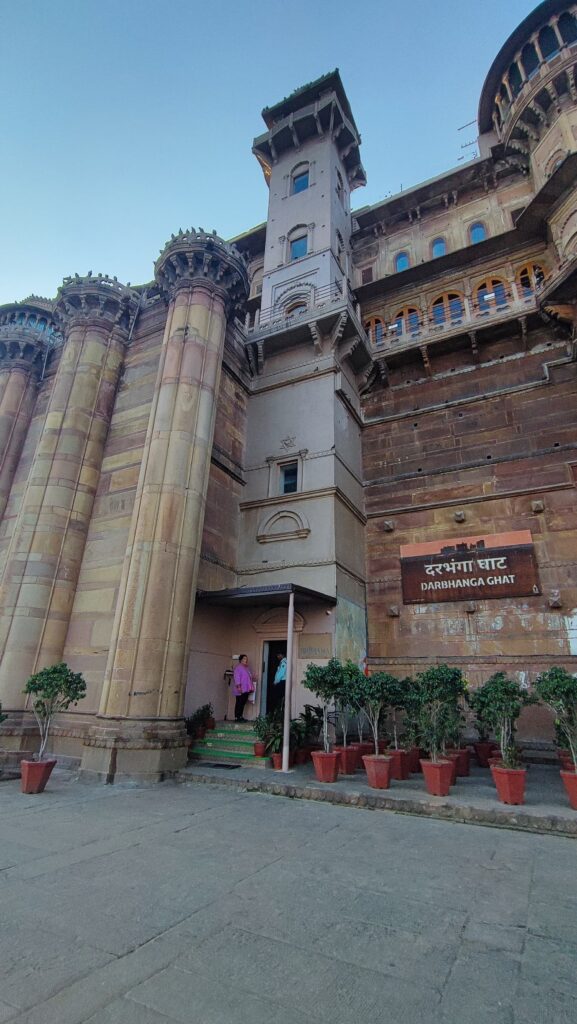
Visit Temples and Shrines
Explore Varanasi’s numerous temples and shrines, each with its own unique architecture and significance.
Don’t miss the Kashi Vishwanath Temple, the Sankat Mochan Hanuman Temple, and the Tulsi Manas Temple.
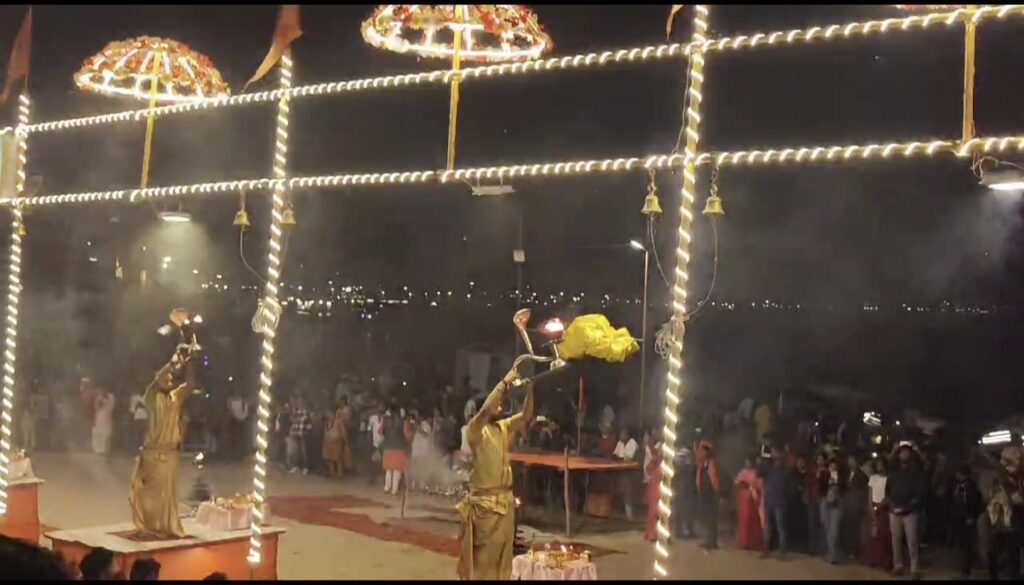
Discover Sarnath
Take a day trip to Sarnath, located near Varanasi, where Lord Buddha gave his first sermon after attaining enlightenment.
Visit the Dhamek Stupa, Mulagandha Kuti Vihar, and the Sarnath Archaeological Museum to learn about Buddhism’s origins.
Attend a Music or Dance Performance
Attending a music or dance performance in Varanasi is an enchanting experience that immerses you in the city’s vibrant cultural tapestry.
Varanasi offers diverse venues for music and dance performances.Traditional Indian music concerts feature instruments like the sitar and tabla.
Dance forms like Bharatanatyam and Kathak depict cultural narratives.The spiritual ambiance enhances the experience. The audience often participates, creating a sense of community.
Cultural exchange opportunities deepen understanding.A memorable experience provides a glimpse into Varanasi’s soul.
Explore the Old City
Wandering through Varanasi’s old city is like stepping back in time. A labyrinth of narrow alleys unfolds before you, lined with ancient temples and pulsating with the energy of bustling markets.
Here’s a glimpse into this fascinating area:
Historic Temples
Meander through the old city and brace yourself to be dazzled by the sheer number of historic temples that majestically rise around you. Among these architectural marvels, adorned with intricate carvings and sculptures, stands the renowned Kashi Vishwanath Temple, dedicated to Lord Shiva. The city’s rich artistic heritage is celebrated in these temples.
Narrow Alleys
Wandering through the narrow alleys of the old city, you’ll encounter a kaleidoscope of sights, sounds, and smells. Traditional houses line these alleys, while vibrant street vendors hawk everything from colorful textiles to aromatic street food. Explore the labyrinthine alleys of the old city and be astounded by the sheer number of historic temples. Local craftspeople keep traditions alive nearby, selling their work.
Don’t forget to sample local street food delicacies along the way.

Take a Cooking Class
Learn to cook traditional Indian dishes with a cooking class in Varanasi.
Begin your culinary adventure by exploring the local markets to find the freshest seasonal ingredients. Next, put your finds to good use by participating in hands-on cooking sessions that will teach you how to prepare authentic recipes.
Experience Silk Weaving
Experiencing silk weaving or shopping for silk sarees in Varanasi is a sensory delight that immerses you in the rich tapestry of India’s cultural heritage.
As you wander through the bustling streets and vibrant markets, you’ll encounter workshops where skilled artisans deftly weave intricate patterns on handlooms, transforming raw silk threads into exquisite fabrics.
The rhythmic clacking of looms fills the air, accompanied by the vibrant hues of silk yarns that dapple the scene.
Exploring boutique stores and traditional shops, you’ll discover a dazzling array of Banarasi silk sarees, each a masterpiece adorned with timeless motifs and embellishments.
Participate in Spiritual Practices
People travel here to connect with their spirituality or learn about it at ashrams.
Many families come to Varanasi to perform rituals for their deceased loved ones, believing it helps their souls find peace in the afterlife.
Many come to Varanasi to meditate and practice yoga, drawn to the city’s spiritual atmosphere.
They find quiet spots by the river or in ashrams (spiritual retreats) to connect with their inner selves.

Varanasi’s Timeless Conclusion
These activities offer a glimpse into the vibrant tapestry of life in Varanasi and ensure a memorable and enriching experience in this ancient city.
In essence, Varanasi transcends the mere definition of a city; it’s a living embodiment of India’s spiritual and cultural heritage.
Its timeless charm and profound significance as a sacred destination leave an indelible mark on all who visit, inspiring introspection, reverence, and a deeper connection to the divine.
Also Read : An alternate travel route to Munnar
